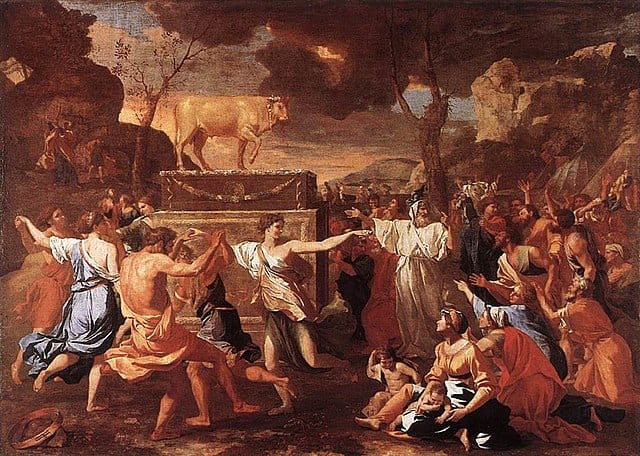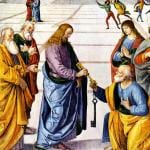
Some argue that the early Jews (i.e., at the time of Abraham or Moses) were monotheists (belief in one God only) or henotheists (Yahweh being preeminent among many gods), but concede that by the time of the prophet Isaiah they had become monotheists. Some more extreme liberals, on the other hand, (astonishingly) extend this supposed polytheism into the New Testament as well!
Here is a thoroughly biblical refutation of such claims. In the initial passages about Abraham (Abram at first), “LORD” is constantly used, and in English Bibles it stands for “YHWH” (Yahweh): the one God. There is no mention of more than one God / god (and this never changes in any of the accounts of Abraham):
Genesis 13:4 (RSV) . . . Abram called on the name of the LORD.
Genesis 13:18 . . . there he built an altar to the LORD.
Genesis 14:22 But Abram said to the king of Sodom, “I have sworn to the LORD God Most High, maker of heaven and earth,
Genesis 17:1 When Abram was ninety-nine years old the LORD appeared to Abram, and said to him, “I am God Almighty; walk before me, and be blameless.
Once the Mosaic Law is established, monotheism (one God and one God only) is crystal clear, and remains so throughout the Bible:
Exodus 8:10 . . . there is no one like the LORD our God. (cf. 1 Chr 17:20; 2 Chr 6:14)
Deuteronomy 4:35, 39 To you it was shown, that you might know that the LORD is God; there is no other besides him. . . . [39] . . . the LORD is God in heaven above and on the earth beneath; there is no other. (cf. Neh 9:6; 2 Sam 7:22; 1 Kgs 8:23; Is 43:10; 44:6, 8; 45:5-6, 14, 18, 21-22; 46:9; 47:8; Hos 13:4)
Deuteronomy 6:4 Hear, O Israel: The LORD our God is one LORD; (cf. Mk 12:29; Jas 2:19)
Deuteronomy 32:39 See now that I, even I, am he, and there is no god beside me; I kill and I make alive; I wound and I heal; and there is none that can deliver out of my hand.
Psalm 83:18 Let them know that thou alone, whose name is the LORD, art the Most High over all the earth.
Psalm 86:10 For thou art great and doest wondrous things, thou alone art God.
Isaiah 37:20 …thou alone art the LORD. (cf. 37:16)
Isaiah 43:10 …Before me no god was formed, nor shall there be any after me.
Isaiah 44:8 …Is there a God besides me? There is no Rock; I know not any. (cf. 44:6; 45:5-6, 21-22; 46:9; Mal 2:10)
And the Bible also explains beyond any doubt that the other “gods” being talked about are not real (only imagined to be by false worshipers). The Bible refers to them in the sense that they exist in other religious belief-systems: not because they exist in fact or reality. Obviously, these sorts of texts are saying that this is all these supposed “gods” are: wood and stone. They have no conscious existence. It’s classic idolatry: that the Jews were judged for again and again throughout the period of the Old Testament:
Genesis 31:19 . . . Rachel stole her father’s household gods.
Genesis 35:2, 4 So Jacob said to his household and to all who were with him, “Put away the foreign gods that are among you, and purify yourselves, and change your garments; . . . [4] So they gave to Jacob all the foreign gods that they had, and the rings that were in their ears; and Jacob hid them under the oak which was near Shechem.
Exodus 20:23 You shall not make gods of silver to be with me, nor shall you make for yourselves gods of gold.
Leviticus 19:4 Do not turn to idols or make for yourselves molten gods: I am the LORD your God.
Deuteronomy 4:27-28 And the LORD will scatter you among the peoples, and you will be left few in number among the nations where the LORD will drive you. [28] And there you will serve gods of wood and stone, the work of men’s hands, that neither see, nor hear, nor eat, nor smell. (cf. 29:17; 1 Chr 16:26; Is 2:8, 20; 31:7; 37:19; 44:10, 15, 17; 46:6; Jer 1:16)
Deuteronomy 28:36 The LORD will bring you, and your king whom you set over you, to a nation that neither you nor your fathers have known; and there you shall serve other gods, of wood and stone. (cf. 28:64: “other gods, of wood and stone”)
Deuteronomy 32:17 They sacrificed to demons which were no gods, . . .
*
2 Kings 19:15-19 And Hezeki’ah prayed before the LORD, and said: “O LORD the God of Israel, who art enthroned above the cherubim, thou art the God, thou alone, of all the kingdoms of the earth; thou hast made heaven and earth. [16] Incline thy ear, O LORD, and hear; open thy eyes, O LORD, and see; and hear the words of Sennach’erib, which he has sent to mock the living God. [17] Of a truth, O LORD, the kings of Assyria have laid waste the nations and their lands, [18] and have cast their gods into the fire; for they were no gods, but the work of men’s hands, wood and stone; therefore they were destroyed. [19] So now, O LORD our God, save us, I beseech thee, from his hand, that all the kingdoms of the earth may know that thou, O LORD, art God alone.” (cf. Is 37:19; 45:20)
2 Chronicles 13:9 . . . Whoever comes to consecrate himself with a young bull or seven rams becomes a priest of what are no gods.
Psalm 40:4 . . . those who go astray after false gods!
Psalm 96:5 For all the gods of the peoples are idols; but the LORD made the heavens. (cf. 97:7; 115:4; 135:15)
Isaiah 37:19 …for they were no gods, but the work of men’s hands, wood and stone.…
Isaiah 44:10 Who fashions a god or casts an image, that is profitable for nothing?
Isaiah 44:15 . . . he makes a god and worships it, he makes it a graven image and falls down before it.
Isaiah 44:17 And the rest of it he makes into a god, his idol; and falls down to it and worships it; he prays to it and says, “Deliver me, for thou art my god!”
Isaiah 46:6 Those who lavish gold from the purse, and weigh out silver in the scales, hire a goldsmith, and he makes it into a god;
then they fall down and worship!
Jeremiah 2:11 Has a nation changed its gods, even though they are no gods? . . .
Jeremiah 5:7 . . . Your children have forsaken me, and have sworn by those who are no gods. . . . (cf. 10:14)
*
Jeremiah 16:20 Can man make for himself gods? Such are no gods! (cf. 51:17)
All of this monotheism is supposedly rare in the Bible, as these particular liberal Catholics claim? Hardly! . . . They live in an alternate universe, or else they are unable to use a concordance or any of the various word-search tools available online.
As for the New Testament, such folks argue that Paul made reference to “many gods and many lords”: thus “proving” that he was either a polytheist or a henotheist. This is erroneous as well. Out of context, that phrase of Paul’s it may sound, prima facie, like polytheism, or henotheism (for those who are ignorant of the contents of the Bible and its theology). Understood in context, it is not at all (note particularly the use of quotation marks in the RSV: insinuating that the existence of these “gods” is denied by Paul:
1 Corinthians 8:4-6 Hence, as to the eating of food offered to idols, we know that “an idol has no real existence,” and that “there is no God but one.” [5] For although there may be so-called gods in heaven or on earth — as indeed there are many “gods” and many “lords” — [6] yet for us there is one God, the Father, from whom are all things and for whom we exist, and one Lord, Jesus Christ, through whom are all things and through whom we exist.
St. Paul also taught:
Galatians 4:8 Formerly, when you did not know God, you were in bondage to beings that by nature are no gods;
Ephesians 4:5-6 one Lord, one faith, one baptism, [6] one God and Father of us all, who is above all and through all and in all.
1 Timothy 2:5 For there is one God, . . .
Some also claim that St. John in the book of Revelation is a henotheist or polytheist, too. I don’t see how. The book of Revelation never includes the word “gods” a single time. Here’s what it teaches:
Revelation 1:8 “I am the Alpha and the Omega,” says the Lord God, who is and who was and who is to come, the Almighty.
As for further clarification of the distinction between henotheism and polytheism, it’s a matter of definition of words. In my opinion (and I think this is pretty straightforward and non-controversial), henotheism is simply one version of polytheism. WikiDiff, “What is the difference between henotheism and monotheism?” states:
Monotheism is a coordinate term of henotheism. Henotheism is a see also of monotheism.
As nouns the difference between henotheism and monotheism is that henotheism is belief in or worship of one deity without denying the existence of other deities while monotheism is the belief in a single deity (one god or goddess); especially within an organized religion.
Another WikiDiff page, “What is the difference between henotheism and polytheism?” states:
Henotheism is a see also of polytheism.
As nouns the difference between henotheism and polytheism is that henotheism is belief in or worship of one deity without denying the existence of other deities while polytheism is the belief of the existence of many gods.
What I have done above was (I think) — with exactly 92 Bible passages: most cited in full — is prove that the Bible (neither OT or NT) teaches neither henotheism nor polytheism. What it teaches is that there is one real and eternal God: transcendent and the Creator of the universe, judge, omnipotent, omniscient, etc., and no other “gods” (i.e., monotheism).
***
Photo credit: The Adoration of the Golden Calf (c. 1634), by Nicolas Poussin (1594-1665). This was an idol, worshiped as a supposed “god” [public domain / Wikimedia Commons]
***













